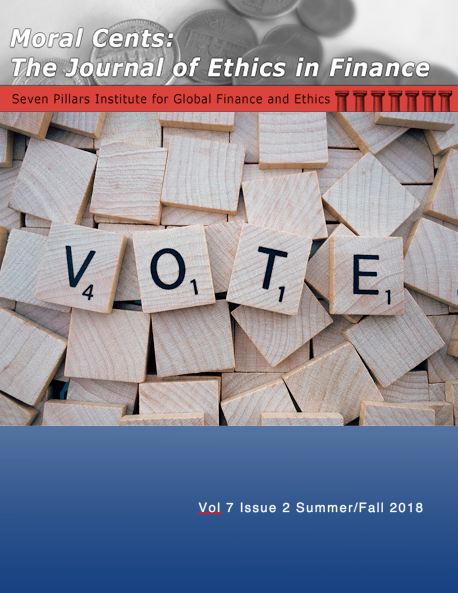Moral Cents: The Journal of Ethics in Finance (Summer/Fall 2018)

The United States is about a week away from mid-term elections. Moral Cents encourages citizens to exercise their democratic right and vote. It matters. Three salient issues voters may wish to think about when choosing their representatives, are the subjects of articles in this issue. All are vital for the country’s wellbeing. The independence of the Federal Reserve is a short-term concern, healthcare is a medium term problem, and many think climate change is a long(ish) term calamity.
First, Hayley Cassedy reviews where the world stands on climate change mitigation. COP23, the 23rdConference of the Parties, took place in Bonn on November 6, 2017. Her summary of the agreements that came out of COP23 gives a tiny measure of hope for achieving some climate change mitigation. Notably, countries, cities, and businesses agreed on twelve specific actions on the financing of climate change prevention methods. As a consequence of US withdrawal from the Paris Agreement, COP23 highlighted the unification of local leadership to act in protecting against a rising global temperature.
Health care is a primary concern for many US voters. Some candidates are talking about the possibility of a universal Medicare, or universal healthcare. Benjamin S. Donaldson compares and contrasts the US and UK systems, private versus nationalized healthcare. The former provides superior healthcare for those who can afford it, but fails those who cannot pay. The latter becomes riddled with inefficiencies. Can there be a middle way?
Politicians hate rising interest rates, because it spells financial pain for voters. The President has been vociferous in criticizing the Federal Reserve for its current interest rate policy. Hayley Siegel evaluates whether it is ethical to destroy the independence of the Fed for sheer political motives. She uses utilitarian analysis backed by both quantitative data and qualitative observations.
Perhaps climate change mitigation and a more compassionate healthcare system will be facilitated by a different way of organizing economies. Brad Seferian reviews Pope Francis’s writing on the present economic-financial system and agrees with the Pontiff that the economy is should be organized not just for the quantitative development of exchange but rather to promote development of the entire person. He suggests a cost benefit methodology as a practical and ethical way to achieving the common good.
To many, the common good does not include economic inequality. Odae Bood, looks at this problem through the lens of the Cuban economy. He gives details on how Cuba ended up with such high levels of inequality despite being a professed socialist country.
These articles may give the reader some ideas and opinions to ponder, and after reflection, hopefully, you will go out and vote!
Moral Cents: The Journal of Ethics in Finance is published by
Seven Pillars Institute for Global Finance and Ethics
ISSN 2326-5663
Editor-in-Chief: Dr. Kara Tan Bhala
Editor: Eric Witmer
